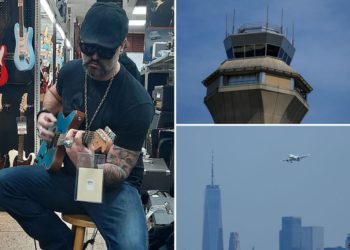Ukrainian and Russian negotiators were poised to meet Friday for the first direct peace talks between their nations since the beginning of the war, after days of confusion and theatrics.
The negotiations are not expected, even by foreign leaders like President Trump who called for them, to yield significant results. But the meeting itself is a win for President Vladimir V. Putin of Russia, who refused to agree to a battlefield cease-fire that Ukraine and almost all of its Western backers had sought as a precondition for talks.
Last weekend, Mr. Putin announced that he would send a delegation to Istanbul for negotiations. Mr. Trump chimed in that he supported the idea. The Russians arrived in the Turkish city and announced on Thursday that they were ready to talk.
The situation put pressure on President Volodymyr Zelensky of Ukraine, who had tried to get Mr. Putin to meet him personally in Turkey for negotiations and also attempted to get Mr. Trump to come.
Mr. Zelensky questioned Russia’s seriousness and the way the talks were being organized. But he agreed to send a Ukrainian delegation led by his defense minister, saying he was doing so out of respect for Mr. Trump and the Turkish president, Recep Tayyip Erdogan.
“There is no time of the meeting, there is no agenda of the meeting, there is no high-level delegation,” Mr. Zelensky said Thursday after meeting with Mr. Erdogan. “I think Russia’s attitude is unserious.”
Maria Zakharova, the Russian Foreign Ministry spokeswoman, responded to Mr. Zelensky’s criticism by calling him a “clown,” a “loser” and a “person with no education at all in relation to people.”
Mr. Zelensky underscored that the United States and Turkey would be involved in the talks. A Turkish official said that Keith Kellogg, Mr. Trump’s special envoy for Ukraine, was in Istanbul on Thursday and that Steve Witkoff, the U.S. special envoy for the Middle East and Russia, was expected to arrive on Friday.
But the Trump administration cast doubt on the talks’ prospects from the outset, despite having called for direct negotiations after failed attempts to mediate a peace earlier this year.
“Look, nothing is going to happen until Putin and I get together,” Mr. Trump told reporters on Air Force One on Thursday as he flew to the United Arab Emirates, the third stop on his Middle East tour.
Secretary of State Marco Rubio echoed the sentiment, saying he didn’t have high expectations for the Istanbul talks. He said it had become “abundantly clear” that a breakthrough would come only through a meeting between Mr. Trump and Mr. Putin.
“I don’t think anything productive is actually going to happen from this point forward until they engage in a very frank and direct conversation, which I know President Trump is willing to do,” Mr. Rubio said.
More broadly, the negotiations looked like an attempt by Mr. Putin to thread the needle.
He wants to keep the attention of Mr. Trump, who is promising a new era of warm ties with Washington, and convince the White House that he isn’t stonewalling on the peace Mr. Trump promised as a presidential candidate.
But Mr. Putin is also still seeking Ukraine’s capitulation, both on the battlefield and in negotiations, after more than three years of full-scale war that has come to define his rule.
In talks with the Trump administration earlier this year, Russian officials made what American negotiators considered unrealistic demands, including for territory still under Ukraine’s control in the four regions that Moscow claims to have annexed.
Skeptics say Mr. Putin could be using the midlevel talks to convince Mr. Trump that the Ukrainians are the obstacle to peace, hoping that the U.S. president will walk away from Kyiv but continue his rapprochement with Moscow — or force a raw deal on Ukraine that is favorable to the Kremlin.
Vladimir Medinsky, the Kremlin aide and former culture minister who is leading the Russian delegation, said on Thursday that his team was ready to resume the talks that took place in Istanbul at the start of the full-scale war in early 2022, the last time Russia and Ukraine held formal direct negotiations.
“We are ready for possible compromises and for their discussion,” Mr. Medinsky said.
During those talks, negotiators produced multiple drafts of a treaty meant to both guarantee Ukraine’s security and satisfy the Kremlin’s demands, but the negotiations ultimately fell apart.
Paul Sonne is an international correspondent, focusing on Russia and the varied impacts of President Vladimir V. Putin’s domestic and foreign policies, with a focus on the war against Ukraine.
The post Peace Talks Between Russia and Ukraine to Begin Amid Doubt and Chaos appeared first on New York Times.



